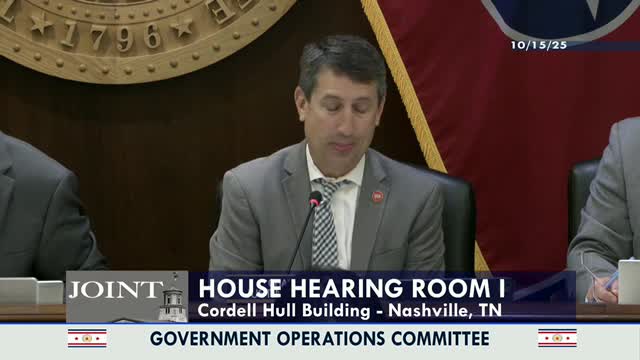Charter Commission emergency rule creates direct replication pathway; committee recommends approval
October 15, 2025 | Government Operations - Rule Review, Joint, Committees, Legislative, Tennessee
This article was created by AI summarizing key points discussed. AI makes mistakes, so for full details and context, please refer to the video of the full meeting. Please report any errors so we can fix them. Report an error »

The Tennessee Public Charter School Commission asked the joint Government Operations Committee on Oct. 15 to approve an emergency rule that governs applications by charter school sponsors seeking to replicate an existing school within the same district.
Tess Stovall, executive director of the Tennessee Public Charter School Commission, explained the rule implements Public Chapter 275 (2025), which created an option for sponsors that have operated a charter school for at least one year to apply either to their local board of education or directly to the Charter Commission to replicate a school with the same academic focus. “One of those pathways, called replication in statute, allows for a charter school sponsor who's had their school open for at least 1 year to apply either to the local board of education or to the charter commission,” Stovall said.
The emergency rule mirrors the commission’s existing new-start application process and includes components such as a capacity interview with the proposed sponsor and a required public hearing in the school district where the new campus is proposed. Hayden Pendergrass and Ashley Thomas of the commission’s staff joined Stovall to explain procedures.
Lawmakers pressed for details about the rubric and appeal process. Representative Parsons asked whether a school authorized by the commission would remain under commission oversight if approved directly by the commission; Stovall said yes. Representative Glenn and others asked whether authorizers would use the same rubric; the commission confirmed the State Board of Education-developed replication rubric would be used by any authorizer and that an applicant denied locally can pursue the statutory appeal process.
Representative Oliver and other members asked about evidence requirements for sponsors with only one academic year of operation. Stovall said one year of operation gives the sponsor the option to apply but does not guarantee approval. The commission described its ability to evaluate academic, operational and financial models using the rubric.
Committee action: Members moved for a positive recommendation for the emergency rule. The recorded Senate count showed five ayes and one no; the House also provided a positive recommendation. The committee issued a positive recommendation for the Commission’s emergency rule.
What was not decided or specified: The emergency rule uses the statutory rubric and the commission said permanent rulemaking will follow; any divergence in authorizer decisions would be resolved through the established appeal routes in statute.
Tess Stovall, executive director of the Tennessee Public Charter School Commission, explained the rule implements Public Chapter 275 (2025), which created an option for sponsors that have operated a charter school for at least one year to apply either to their local board of education or directly to the Charter Commission to replicate a school with the same academic focus. “One of those pathways, called replication in statute, allows for a charter school sponsor who's had their school open for at least 1 year to apply either to the local board of education or to the charter commission,” Stovall said.
The emergency rule mirrors the commission’s existing new-start application process and includes components such as a capacity interview with the proposed sponsor and a required public hearing in the school district where the new campus is proposed. Hayden Pendergrass and Ashley Thomas of the commission’s staff joined Stovall to explain procedures.
Lawmakers pressed for details about the rubric and appeal process. Representative Parsons asked whether a school authorized by the commission would remain under commission oversight if approved directly by the commission; Stovall said yes. Representative Glenn and others asked whether authorizers would use the same rubric; the commission confirmed the State Board of Education-developed replication rubric would be used by any authorizer and that an applicant denied locally can pursue the statutory appeal process.
Representative Oliver and other members asked about evidence requirements for sponsors with only one academic year of operation. Stovall said one year of operation gives the sponsor the option to apply but does not guarantee approval. The commission described its ability to evaluate academic, operational and financial models using the rubric.
Committee action: Members moved for a positive recommendation for the emergency rule. The recorded Senate count showed five ayes and one no; the House also provided a positive recommendation. The committee issued a positive recommendation for the Commission’s emergency rule.
What was not decided or specified: The emergency rule uses the statutory rubric and the commission said permanent rulemaking will follow; any divergence in authorizer decisions would be resolved through the established appeal routes in statute.
View full meeting
This article is based on a recent meeting—watch the full video and explore the complete transcript for deeper insights into the discussion.
View full meeting
